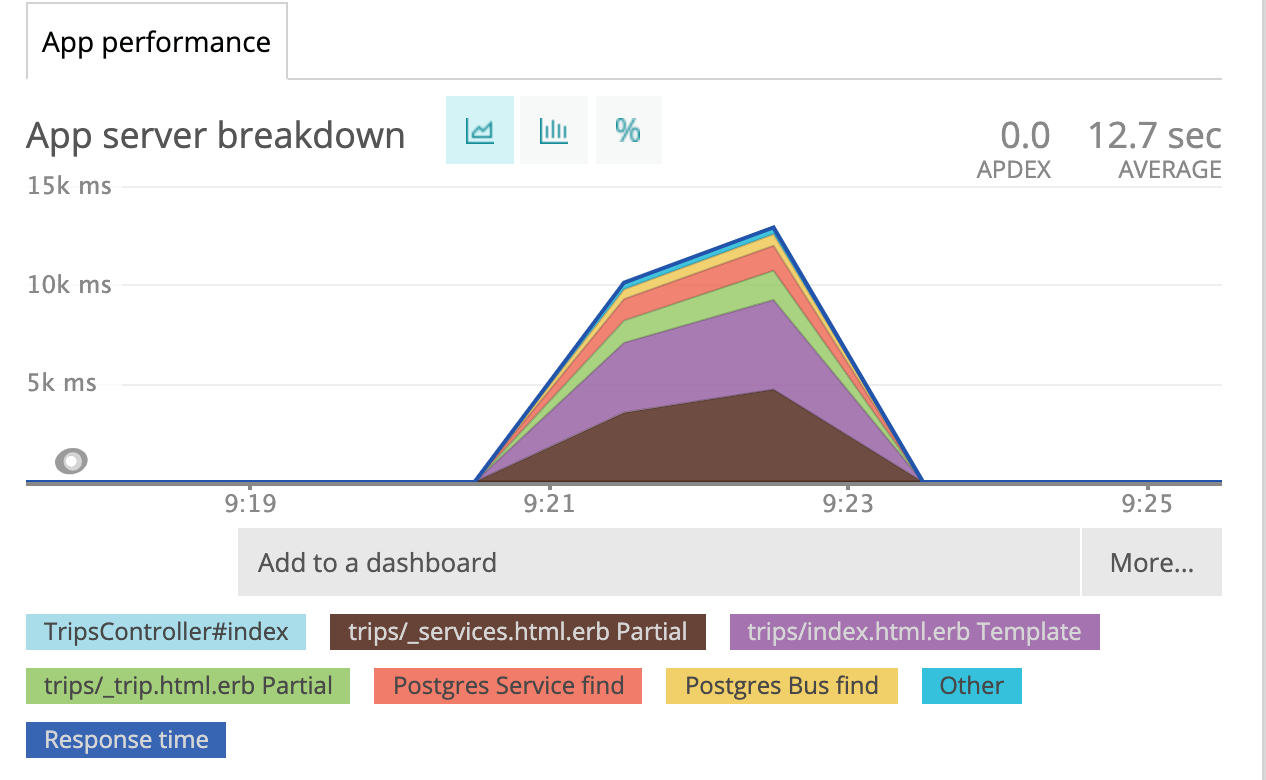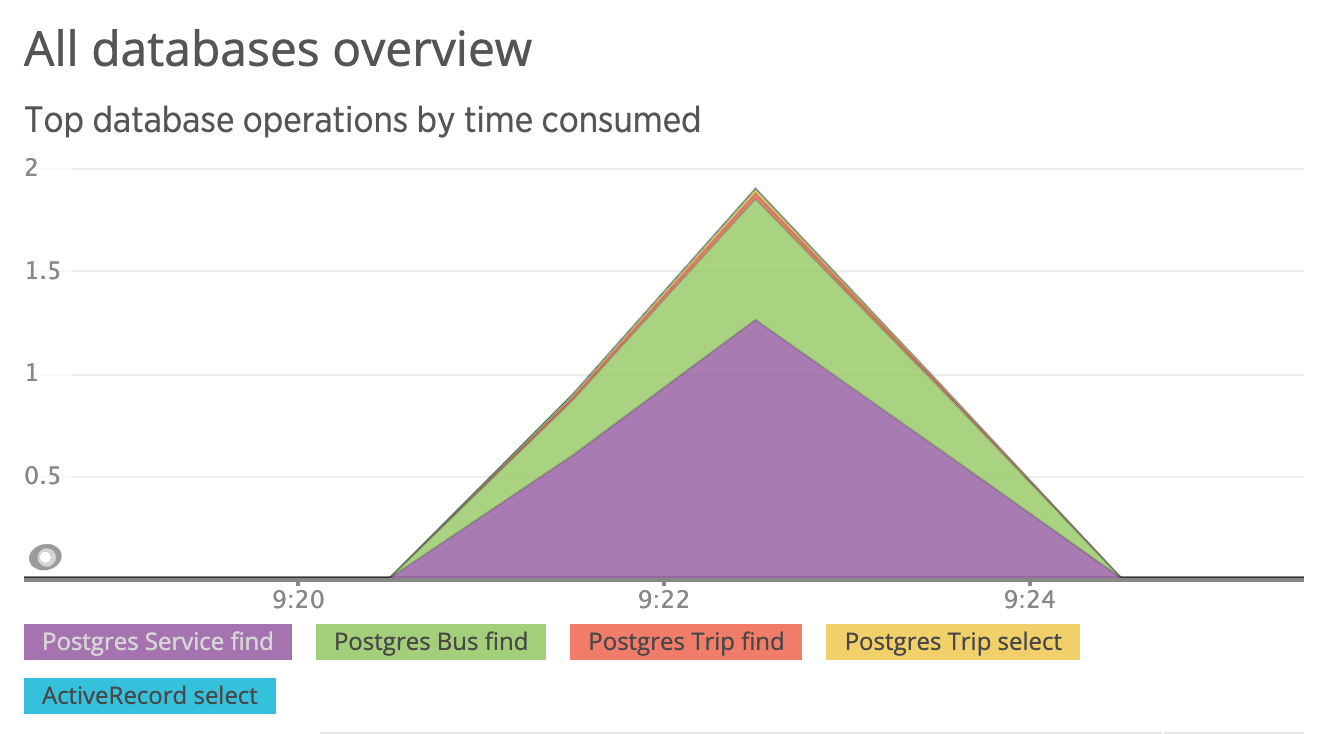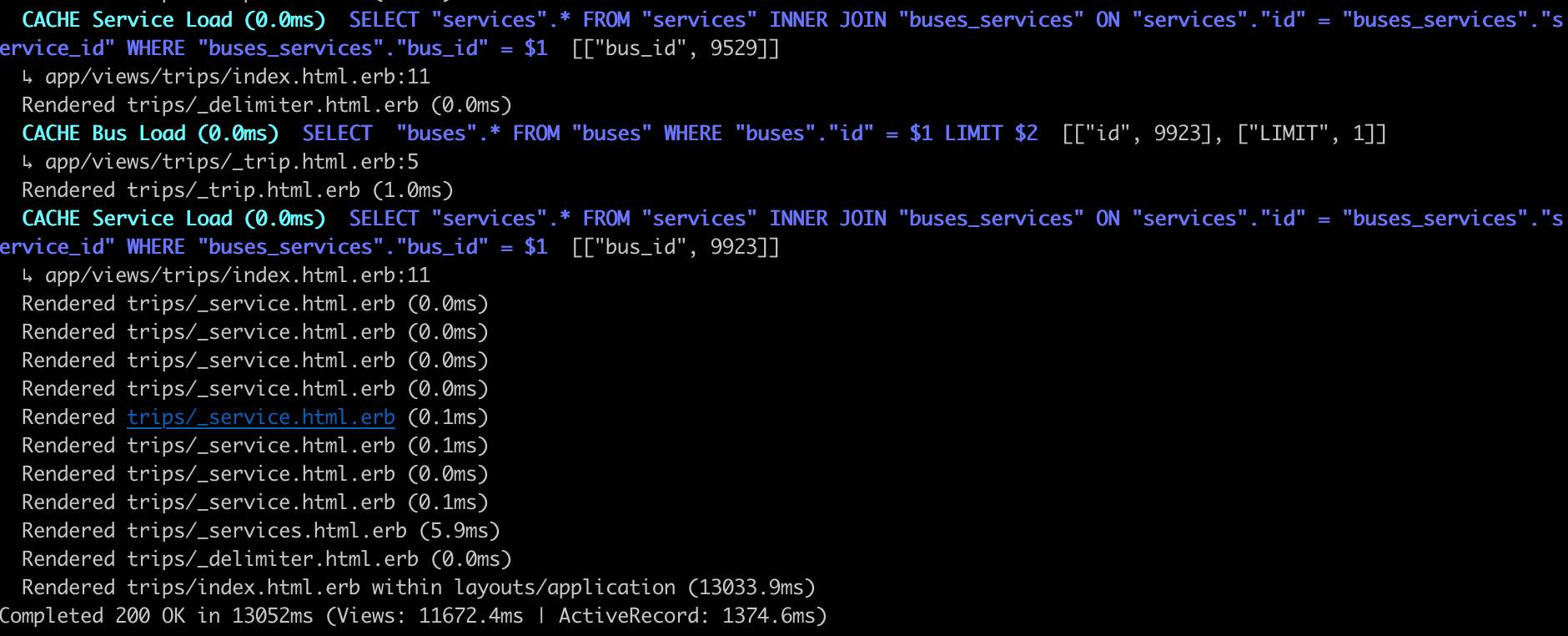Optimization of loading large json files into database as well as rendering web pages speed with the given amount of data.
- Optimize program to load large.json file within one minute.
- Figure out how we can render schedule pages faster
- gem pghero
- newrelic
- gem activerecord-import
- gem strong_migrations
- benchmark
- apache benchmark testing
- desided to start with
small.jsonin order to increase feedback loop - extracted logic from rake tasks in it's own service so that it's easier to test.
- wrote test for loading
.jsonfiles - by implementing any changes on database level I made sure tests are passing and my benchmark metrics show better results
- I decided to insert records not one by one, but in bulk (for this I used gem activercord-import). I accumulate model instances in hashes. This allows quickly access the required instance by key, as well as avoid duplicate records. As a result, all imports are done in four inserts.
- I used Oj gem for parsing json.
- CPU time
- system CPU time
- the sum of the user and system CPU time
- the elapsed real time. The unit of time is seconds.
Initial results of running bundle exec rake 'reload_json_benchmark[fixtures/small.json]' and bundle exec rake 'reload_json_benchmark[fixtures/medium.json]':
Results of running be rake 'reload_json_benchmark[fixtures/small.json]' after optimization and using gem oj, gem activerecord-import:
-
I added a test that checks the response from the problematic endpoint in order to prevent logic changes.
-
To assess the effectiveness of the changes, I used apache benchmark tools (10 requests with concurrency 1). The measurements were made on the basis that was imported from the small.json file.
-
To find bottlenecks I used Newrelic, rails console and gem pghero
Rendering the page turned out to be the most time-consuming, as can be clearly seen from the graph:
-
First, I removed the unnecessary splitting into partial 's, since it has no value, but it slows down document generation.
-
Second, I replaced rendering of partials in a loop with rendering of a collection.
The problem of N + 1 Query is clearly to see in the newrelic report and from rails: the bus and services associations are called for each request from the view.
We can use eager_load and call all related records with one request. So, it makes one query for each request, but a more complex one, including joining tables.
- With indicies but without front end optimization
ab -n 10 -c 1 http://localhost:3000/автобусы/Самара/Москва
Server Software:
Server Hostname: localhost
Server Port: 3000
Document Path: /автобусы/Самара/Москва
Document Length: 538780 bytes
Concurrency Level: 1
Time taken for tests: 247.233 seconds
Complete requests: 10
Failed requests: 0
Total transferred: 5395342 bytes
HTML transferred: 5387800 bytes
Requests per second: 0.04 [#/sec] (mean)
Time per request: 24723.295 [ms] (mean)
Time per request: 24723.295 [ms] (mean, across all concurrent requests)
Transfer rate: 21.31 [Kbytes/sec] received
Connection Times (ms)
min mean[+/-sd] median max
Connect: 0 0 0.0 0 0
Processing: 22301 24723 948.8 25043 25566
Waiting: 22300 24723 948.9 25043 25566
Total: 22301 24723 948.8 25043 25566
Percentage of the requests served within a certain time (ms)
50% 25043
66% 25186
75% 25199
80% 25265
90% 25566
95% 25566
98% 25566
99% 25566
100% 25566 (longest request)
- After removing partials and adding collections
ab -n 10 -c 1 http://localhost:3000/автобусы/Самара/Москва
Server Software:
Server Hostname: localhost
Server Port: 3000
Document Path: /автобусы/Самара/Москва
Document Length: 569667 bytes
Concurrency Level: 1
Time taken for tests: 45.169 seconds
Complete requests: 10
Failed requests: 0
Total transferred: 5704204 bytes
HTML transferred: 5696670 bytes
Requests per second: 0.22 [#/sec] (mean)
Time per request: 4516.931 [ms] (mean)
Time per request: 4516.931 [ms] (mean, across all concurrent requests)
Transfer rate: 123.33 [Kbytes/sec] received
Connection Times (ms)
min mean[+/-sd] median max
Connect: 0 0 0.0 0 0
Processing: 3838 4517 448.1 4523 5575
Waiting: 3838 4516 448.1 4522 5575
Total: 3838 4517 448.1 4523 5575
Percentage of the requests served within a certain time (ms)
50% 4523
66% 4573
75% 4583
80% 4725
90% 5575
95% 5575
98% 5575
99% 5575
100% 5575 (longest request)
As we can see from the results above after getting rid of partials and rendering partial with collection
- Time taken for tests reduced from 247.233 seconds to 45.169 seconds
- Time per request reduced from 24723.295 [ms] (mean) to 4516.931 [ms] (mean)
- Requests per second increased from 0.04 [#/sec] to 0.22 [#/sec] (mean)





